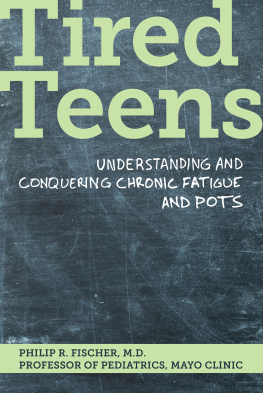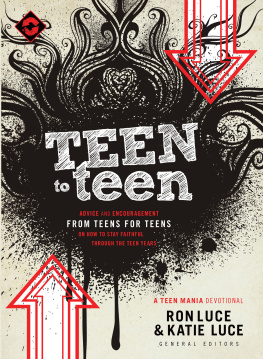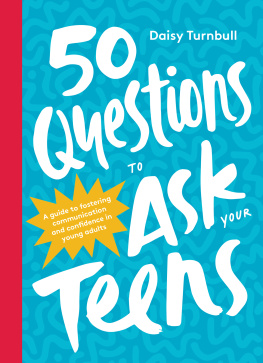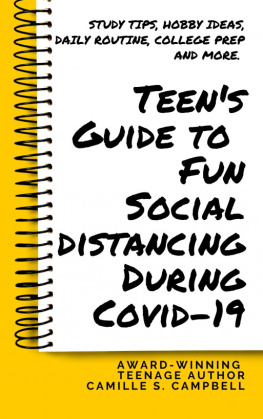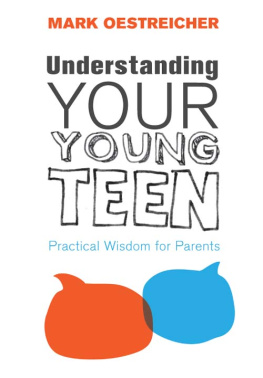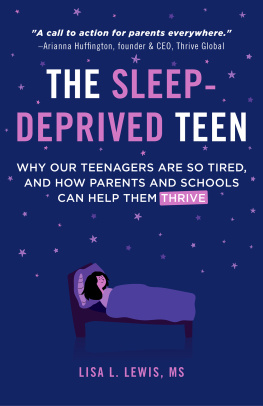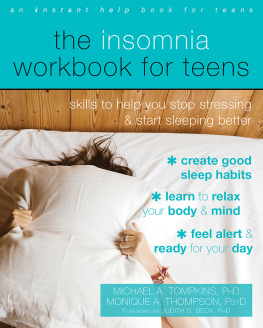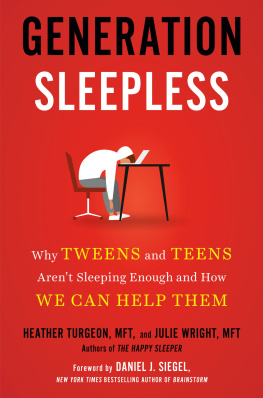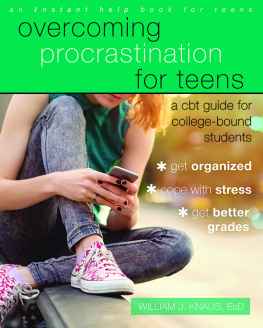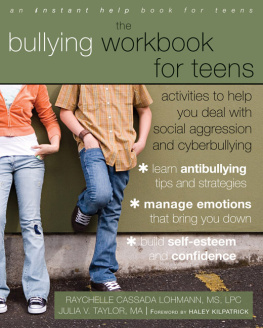
Welcome, readers!
I, my family, thousands of tired teenagers, and this book have grown up together.
Personally, I was down with chronic post-infectious fatigue when my third child was born three decades ago. I was recovering when my fourth child was born. That fourth child did a high school science project about postural orthostatic tachycardia syndrome (POTS) several years ago and then became the father of a daughter on the same day that the proof copy of this book was delivered to me.
Through generations, children grow through adolescence into adulthood, sometimes with debilitating fatigue along the way. Yet, there is always hope of recovery and of new birth. From my personal and professional experiences, this book has been born and is now delivered to you.
I offer this book with the hope that it will encourage and inspire you as you face chronic fatigue in yourself or in someone about whom you care deeply. I give you these words and pages in expectation that you, too, will find healing and recovery. I am eager to see and hear about how your recoveries will allow you to grow and serve others. May this book help overcome illness, restore health, provide hope, and generate life-enhancing productivity.
Share your stories and ideas with me at .
Enjoy!
Phil Fischer
Table of Contents
Acknowledgments
It has been 15 years since this book was initially conceived, and it has been over a decade since the actual drafting of a manuscript began. I am very grateful to many key individuals who have been instrumental in making this book available to readers. A high school writing teacher, the late Rod Flagler, inspired a passion for writing within me. Fred Glauser ignited my passion for medical research. Chris Frye and Neil Gudovitz helped turn ideas about tired teenagers into a book proposal. Olivia Smoldt-Hall provided professional expertise in molding my writing style into more engaging prose. Rachel Haring Bartony, along with Dan Harke and Karen Wallevand at Mayo Clinic Press, skillfully turned my initial faltering drafts into the book you see before you now.
Shelley Ahrens has shared patients with me and contributed greatly to the actual writing of this manuscript. The contributions of Laura and her parents brought this book to life, with hope and healing for readers; now Laura is doing high-level research about the anatomy and physiology of brain connectivity in patients with POTS and pain. Jeannie Clark, Kay Comisky, Amy Belal, and Meg Steuer help our shared patients make practical steps toward recovery, and I am grateful for Jeannies and Kays tangible contributions to this book.
Along the way, I have learned from and with Co-Burn Porter, Dawn Nelson, Chad Brands, Jon Caudill, Karen Ytterberg, Amie Jones, Kelsey Klaas, Mike Farrell, and many others in Rochester, Minnesota. Our ongoing research and patient care at Mayo Clinic is helped by subspecialty colleagues, including Ken Mack, Sheri Driscoll, Cindy Harbeck-Weber, Bridget Biggs, Daniel Hilliker, Tracy Harrison, Bob Wilder, Louai Manini, Robin Lloyd, and the rest of our Mayo Clinic Adolescent Autonomic Dysfunction Working Group (generously supported by the Greg and Beth Wahl family).
I have benefited from professional friendships with co-laborers in the conquest to overcome chronic fatigue around the world Nelly Ninis, Raewyn Gavin, Nancy Kuntz, Julian Stewart, Marvin Medow, Gisela and Tom Chelimsky, Imad Jarjour, Paul Pianosi, Mohammed Numan, and many others in the pediatric group within the American Autonomic Society.
I have been blessed by the help of Debbie Dominelli at Dysautonomia Youth Network of America and have enjoyed collaboration with the Freemans at The Dysautonomia Project and Lauren Stiles at Dysautonomia International. Julie and Gil Chinitz and American Dysautonomia Institute have been helpfully supportive over the years. Lesley Kavi and the whole POTS UK group have taught me lots, too. And adult colleagues who know lots more about POTS than I do have helped me along the way Phillip Low, Wolfgang Singer, Paola Sandroni, and others at Mayo Clinic and through the American Autonomic Society with people like Bill Cheshire and Satish Raj. Robin Youngson from Hearts in Healthcare and friends in the Paediatric Society of New Zealand helped refine my thoughts about caring for tired teenagers.
Positive value from the content of this book is due to the helpful input and influence of these and many other key professionals; problems in the book are my responsibility, and Id like to hear about them so they can be corrected if there is a subsequent edition of this book.
Personally, patients and coworkers have been my extended family over the years. But I am fundamentally grateful for and indebted to my wife, Juli, and our five children, two daughters-in-law, and now four grandchildren for their support, help, and encouragement throughout this long process. Mostly, though, I attribute whatever hope and healing this book provides for tired teenagers and their families to the grace and power of God who makes all things possible.
To all, thanks very much.
Preface
Teenagers are tired.
In near-epidemic proportions, adolescents today are struggling with fatigue.
Teenagers know this. Many hit the snooze button and delay getting out of bed for as long as possible in the morning. Theyre still dragging when they get to school, and they use caffeinated drinks to help them get through the morning.
Parents know teens are tired. They struggle to encourage their kids to get up and get ready for school, but they feel like theyre nagging. Then long after their own bedtime, parents try to convince their teenagers to go to bed so parents wont be so tired in the morning.
Schools know teenagers are tired. Some have even tried shifting to a later morning start time. Teachers recognize that adolescent academic performance improves midmorning.
And doctors know teenagers are tired. Research suggests that close to a third of American adolescent girls struggle with morning fatigue more than once a week. In Europe, about 20% of Dutch girls and 7% of Dutch boys struggle with tiredness that has persisted for more than three months. In England, more than one out of every 100 adolescents is disabled with fatigue and unable to participate in regular school and social activities.
Fatigue is common, and it messes up lives. All over the world, teenagers and their families struggle with fatigue. Unfortunately, neither the teenagers nor their parents understand why teens are so tired, and their doctors have struggled unsuccessfully to give them clear answers.
Why are so many teenagers tired?
Is there an underlying mystery diagnosis robbing adolescents of energy?
How can they recover?
You see, Im a pediatrician, and I care for patients who travel up to thousands of miles to find answers and to begin recovery. Many of my patients are tired, and they havent started getting better despite even years of good motivation and dedicated effort by themselves, by their families, and by their doctors. Most of the people we see end up finding answers, hope, and healing. This is good, but the word has spread. Hundreds of families want to come see the team with which I work, but we cant grow our staff fast enough to see all the people who want to come for help.
So Im writing this book as a personal message to you, whether youre a tired teen or the loved one of a tired teen. My goal is to help you find direction in your quest for recovery. My goal is to provide you with answers and with the tools to help you actually get better. Id love to meet you and to work with you personally, but Id love it even more if you could recover without needing to see us.
Next page
